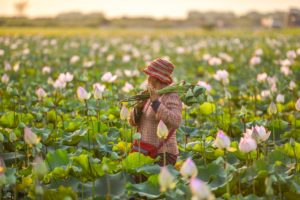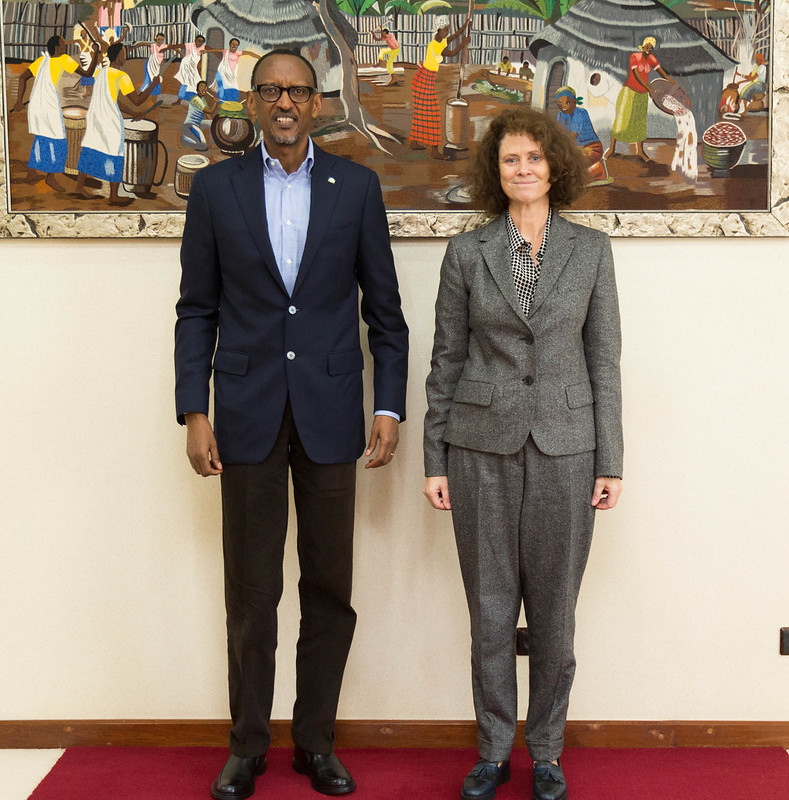 Several activists and actors have raised alarm over the potentially devastating effects that personal protective equipment (PPE) can have in terms of increasing pollution around the world. There have been reports of PPE waste collecting on coasts around the world. Plastic pollution negatively impacts ocean health and, for maritime nations, this could translate to economic losses and the loss of livelihoods for those working within the ocean economy. One study by Plastics Hub found that if every person living in the UK utilized a single-use face mask for every day of 2020, it would contribute an additional 66,000 tons of plastic waste. It is unclear how much of this waste could end up in marine environments, but with 150 million tonnes already circulating the earth’s water, there is a pressing urgency to address the unsustainability of single-use face masks to fight the spread of COVID-19. As a result, an eco-friendly designer in Cambodia created lotus face masks to address this PPE waste.
Several activists and actors have raised alarm over the potentially devastating effects that personal protective equipment (PPE) can have in terms of increasing pollution around the world. There have been reports of PPE waste collecting on coasts around the world. Plastic pollution negatively impacts ocean health and, for maritime nations, this could translate to economic losses and the loss of livelihoods for those working within the ocean economy. One study by Plastics Hub found that if every person living in the UK utilized a single-use face mask for every day of 2020, it would contribute an additional 66,000 tons of plastic waste. It is unclear how much of this waste could end up in marine environments, but with 150 million tonnes already circulating the earth’s water, there is a pressing urgency to address the unsustainability of single-use face masks to fight the spread of COVID-19. As a result, an eco-friendly designer in Cambodia created lotus face masks to address this PPE waste.
Is There a Way to Combat PPE Pollution?
Cambodia is not exempt from the negative impacts that pollution can have on marine environments. The Food and Agriculture Organization of the United Nations (FAO) identifies Cambodia as being highly dependent on its aquatic resources for both food security and the livelihoods of the Cambodian people. In 2013, Cambodia averaged 700,000 tons of fishing and aquaculture production. At a conference on maritime issues in Cambodia in 2015, hosted by the National University of Management in Phnom Penh, speakers highlighted the risk pollution poses to the economic livelihoods of those who depend on the marine economy. The FAO has also spoken about the degradation of the marine habitat in the country due to pollution. Photographer Niamh Peren described one scene of coastal pollution in Sihanouk, Cambodia as “mountains and mountains of plastic.” Pollution in the marine environment is a global problem. Due to the nature of the ocean’s currents, marine plastic pollution does not respect national boundaries and one country’s actions will not be enough to address the problem alone. However, Awen Delaval, an eco-friendly fashion designer, is implementing an innovative solution to tackling plastic pollution, while simultaneously diversifying the economy in Cambodia and alleviating poverty rates in the country.
Turning Unwanted Lotus Stems into Organic Fabric
Delaval’s lotus face masks are made utilizing ancestral techniques of producing lotus fiber from lotus stems, which are commonly regarded as waste within the country. The entire process of creating sustainable lotus face masks is entirely eco-friendly, as well as biodegradable. The fabric produced using lotus fibers is remarkably efficient at filtration and, according to Delaval, is a superior fabric due to its light texture and breathability. The eco-textile company Samatoa, which Delaval manages, produces lotus masks that meet the standards of both the United States’ CDC and France’s Association Francaise de Normalization, making them an effective alternative to plastic single-use face masks. Samatoa also values the tenets of fair trade and has made a positive impact on the livelihoods of poor Cambodians in the Battambang province. The company has provided employment that empowered thirty Cambodia women to be financially independent and provide for their families. According to Samatoa, the wages earned by company workers are twice what they would receive from other textile work in the country. Additionally, the company ensures that workers have access to a number of benefits, including trade union rights, paid leave and health insurance.
Impact of Lotus Face Masks
Delaval’s innovative solution to plastic pollution produced from single-use face masks gained international attention. The company he manages, Samatoa, is striving to increase production and capacity to improve the lives of an additional 500 women. Samatoa also provides educational opportunities to lotus farmers on sustainable farming practices, further improving the lives of the Cambodian people. Deval’s lotus face masks provide a sustainable solution to the problem of PPE waste while simultaneously providing economic development to rural communities in Cambodia. – Leah Bordlee Photo: Pixabay
The post Lotus Face Masks in Cambodia: A Sustainable Solution to High Mask Demand appeared first on The Borgen Project.
Original Source: borgenproject.org

On July 1, Carolyn Tuck became the new World Bank Vietnam Director. The former director was Ousmane Dione from 2016 to 2020. Tuck’s past can be linked to her early days working at the World Bank organization, where she worked in Vietnam as the Senior Poverty Specialist. Tuck was also “Senior Social Development Specialist and Lead Social Development Specialist in Eastern Europe and Central Asia Region”, according to World Bank.org.
Tuck’s Leadership
Conditions in Vietnam have steadily improved under Tuck’s leadership. As of 2019, Vietnam was no longer considered a low-income poverty-stricken country after the extreme poverty rate declined from 50% to 2%. Per-capita income has risen at an exceptional rate, spiking from $100 in 1980 to $2,300 in 2017, according to the UN.
This exponential growth is fostered by investment in human capital. Education rose to 12% of the GDP while increasing health insurance, living conditions, and increased access to land all improved conditions for Vietnamese citizens. The investment has paid off since Vietnam is making strides in international education testing along with health care spending, which was 7% GDP.
Tuck plans to exceed these numbers by making Vietnam a high-income country by 2045. The per capita income would have to be $12,535, which means it would have to rise by $10,000.
The World Bank’s Collaboration
The World Bank is helping this become a reality for Vietnam and Tuck by providing “$24.86 billion in grants, credits, and loans.” The World Bank also continues to invest in human capital by committing $516.67 million for Vietnam’s transportation, urban development, higher education, and climate change reduction.
There are still some problems the new World Bank Vietnam Director has to tackle before Vietnam can be declared as a high-income nation. Although investments in education have become a priority in the years past, higher-level education still needs to increase. This links back to income levels because families need money in order to send their children to higher learning institutions. The lack of higher income is caused by low agricultural income due to sub-optimal crop choice and fewer yields from the same crop type on the same type of land. The amount of land being used as capital has dropped significantly too by 10% in 2014.
Looking Forward
The way to improve this is by increasing crops that are profitable and strengthen land usage. The investment needs to continue throughout education and social growth. Education can grow by giving equal opportunity to all, especially in an impoverished country such as Vietnam.
Programs like “Save the Children” and “Child Survival Project,” have a single mission: to help children’s environment and education grow exponentially. They also provide health education and care to children in need through school health programs, according to their website. They’ve protected 27,495 children from harm, supported 60,574 children in times of crisis, and have given over eight million children a healthy start in life, according to their website.
For agriculture, The Asia Foundation helps develop Vietnam’s environment by having community-based environmental management, increased capacity of environmental agencies and NGOs, public consultation and advocacy on environmental laws and policies, youth education, and disaster risk management, according to their website. The Asia Foundation has supported laws and policies like the “Tourism and Law on Environment Protection” in 2005 and the “Law on Environmental Protection Tax” in 2010. The “Law on Environmental Protection Tax” was used to redirect public funds toward environmental issues. A case study was done by “Willenbockel of the Institute of Development Studies” projects that CO2 emissions will drop by 2.3-7.5%, depending on the tax rate. The Asia Foundation is supporting the Ministry of Education to help integrate environmental studies into school activities at 10 primary schools in Hanoi, said to reach 6,000 students, according to their website.
With these steps laid out, Carolyn Tuck as the new World Bank Director can lead Vietnam to new economic grounds never seen before and hit high-income statues by 2045.
– Grant Ritchey
Photo: Flickr
The post New World Bank Vietnam Director Fighting Poverty appeared first on The Borgen Project.
Original Source: borgenproject.org
 Several activists and actors have raised alarm over the potentially devastating effects that personal protective equipment (PPE) can have in terms of increasing pollution around the world. There have been reports of PPE waste collecting on coasts around the world. Plastic pollution negatively impacts ocean health and, for maritime nations, this could translate to economic losses and the loss of livelihoods for those working within the ocean economy. One study by Plastics Hub found that if every person living in the UK utilized a single-use face mask for every day of 2020, it would contribute an additional 66,000 tons of plastic waste. It is unclear how much of this waste could end up in marine environments, but with 150 million tonnes already circulating the earth’s water, there is a pressing urgency to address the unsustainability of single-use face masks to fight the spread of COVID-19. As a result, an eco-friendly designer in Cambodia created lotus face masks to address this PPE waste.
Several activists and actors have raised alarm over the potentially devastating effects that personal protective equipment (PPE) can have in terms of increasing pollution around the world. There have been reports of PPE waste collecting on coasts around the world. Plastic pollution negatively impacts ocean health and, for maritime nations, this could translate to economic losses and the loss of livelihoods for those working within the ocean economy. One study by Plastics Hub found that if every person living in the UK utilized a single-use face mask for every day of 2020, it would contribute an additional 66,000 tons of plastic waste. It is unclear how much of this waste could end up in marine environments, but with 150 million tonnes already circulating the earth’s water, there is a pressing urgency to address the unsustainability of single-use face masks to fight the spread of COVID-19. As a result, an eco-friendly designer in Cambodia created lotus face masks to address this PPE waste.